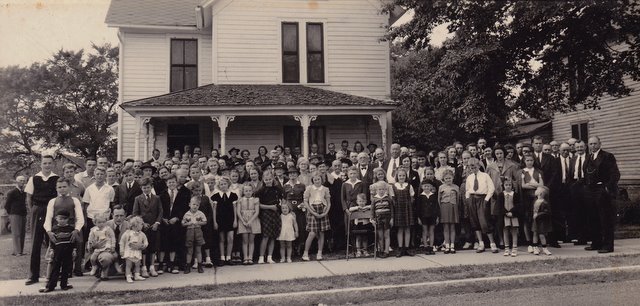Early 1800s: Before Durham was Durham, Prattsburg (Edgemont today) and Pinhook (near Erwin Square today) were two of the small settlements in the area. Wheat was the main cash crop.
1853: Post Office established at "Durham's" (named after country doctor who enjoyed serenading the town on moonshiny nights).
1858: First tobacco factory established at Durham Station, making Best Spanish Flavored Smoking Tobacco.
1865: New owner renames brand "Genuine Durham Smoking Tobacco" and adopts the bull emblem.
1865: Generals Sherman and Johnston negotiate Confederate surrender (largest troop surrender of the war) at Bennitt farm, three miles west of Durham Station.
1872: Durham establishes Maplewood Cemetery. Louis Austin, who favored the site for a ball park, is killed in fireworks demonstration and instead becomes occupant of Burial Marker No.1.
1874: Washington Duke moves residence and tobacco business into Durham.
1877: First reference to "Hayti" as name of African American community south of downtown.
1881: Durham County created (out of eastern half of Orange County).
1884: Julian Shakespeare Carr creates Durham Cotton Manufacturing Co in what was Prattsburg. The Durham Daily Sun rejoices: "In place of this dark hole of iniquity and infamy, there will be a busy, bustling manufacturing community."
1887: Durham Street Railway Corp. begins horse-drawn streetcar service.
1890: Buck Duke creates American Tobacco Company, controlling 90% of US cigarette market.
1892: Trinity College moves to West Durham from Randolph County (rejecting Raleigh's offer of Pullen Park). Julian Carr is early benefactor and donates his fairgrounds to build what is now East Campus.
1892: To diversify its investments, Duke builds the Erwin Cotton Mills on Ninth Street, near what was Pinhook. Hires William Erwin to run the new mills. Tidy mill village replaces "a rough and roaring place."
1892: African American George Wall arrives with Trinity College and buys land to north of campus, an area that will eventually be called Walltown.
1895: Erwin Park established, eventually becoming a city park -- Durham's oldest public park.
1898: John Merrick establishes NC Mutual Insurance Co, nation's oldest and largest black-owned insurance company.
1905: With the hoots of factory whistles, President Teddy Roosevelt arrives in West Durham on train and declares, "As I came in, gentlemen, I felt as if I was at a football contest."
1908: Construction begins on Watts Hospital at Broad and Club Blvd, for white patients only.
1908: Duke Land & Improvement Company formed and it begins to sell plots in what is to become Trinity Park.
1909: Meetings in Durham's City Hall were held on the second floor (above the sights, smells and sounds of a very active city market). Today, the City Council meets above the sights, smells and sounds of the City-County Planning Department.
1910: North Carolina Central University opens its doors, becomes nation's first state-supported liberal arts college for African American students.
1910: In one of the Bull City's early large-scale speculative real estate ventures, the Durham Consolidated Land & Improvement Co begins to develop Walltown.
1910: Construction begins on Club Estates (community eventually becomes Watts Hospital-Hillandale).
1911: US Supreme Court breaks up American Tobacco Trust into smaller companies.
1913: Durham Bulls play first season of baseball on Hanes Field at Broad and Perry.
1924: Trinity College becomes Duke University, tries to expand its campus northward and then buys Rigsbee farm to grow westward. Italian stonecutters move to West Durham to work on new chapel and hospital.
1925: West Durham annexed into Durham. Repetitive street names like Holloway, Washington and Blacknall are changed. Ninth Street remains Ninth Street. Indoor plumbing replaces out-houses.
1926: Durham Auditorium (Carolina Theatre) opens.
1934: Tens of thousands of textile workers throughout the South walked off the job protesting conditions at the mills and mill villages. Hundreds of striking Erwin Mills workers rallied at the Carolina Theatre, marched down Main Street and enjoyed widespread community support. Across South, some 20 workers die in strike-related violence.
1934: Grammy award winning composer John D. Loudermilk born on a kitchen table at Knox and Iredell, wrote 1500 songs including "Tobacco Road" (Lou Rawls).
1935: Durham Committee on Negro Affairs formed.
1937: Hayti disturbances follow defeat of James Braddock by Joe Louis, for boxing crown.
1941: Blind Boy Fuller dies, father of Piedmont Blues is buried in Durham (city marker can be seen on bike path by Fayetteville Street Elementary School).
1943: Black WWII soldier killed by white bus driver on West Club Blvd. Many business districts erupt in violence.
1949: What is today the city's oldest fire station is built on Ninth Street.
1957: Sit-in demonstration at Royal Ice Cream parlor.
1959: Durham High School desegregated.
1960: Sit-in demonstrations at downtown lunch counters, Martin Luther King speaks at White Rock Church.
1965: Construction of Durham Freeway begins (tearing apart Hayti, Brookstown, Erwin Park, Hickstown and Crest Street communities).
1967: Union Station demolished for Downtown Loop.
1971: Trinity Park forms first neighborhood association.
1986: Erwin Mills (Burlington Industries) closes.
1987: American Tobacco factory closes.
1995: Old West Durham Neighborhood Association established.
2000: Durham enters new millennium with party at George's Garage in booming Ninth Street district.
2000: Old West Durham designated a "Local Legacy" by US Library of Congress.
2003: Durham observes 150th anniversary.
--Adapted (with liberal revisions) from the Durham Herald-Sun

Alexander Cheek Homeplace (ca 1941)
212 Chase Street (now named Alexander Ave on Duke's Central Campus)
Cheek-Smith family gathering. Alexander Smith and Reuben Hibbard were the main founders of West Durham Methodist (now Asbury United Methodist). Alexander Ave was named after Alexander Smith. many of the old granite curbstones that were here before Central Campus are now stepping stones next to the big pond at Duke Gardens. (Photo courtesy of Clint Smith of Durham, Alexander Smith's great-great grandson.)

